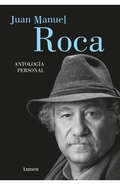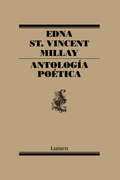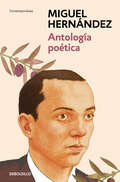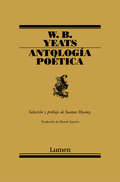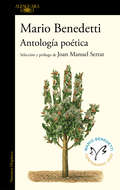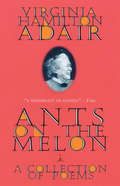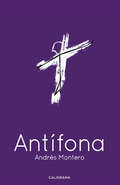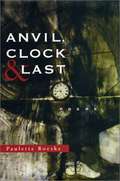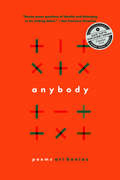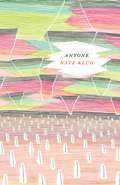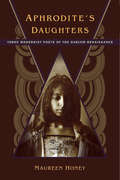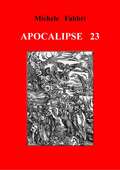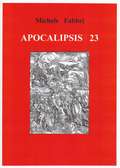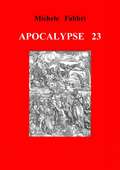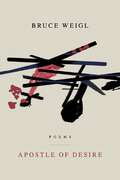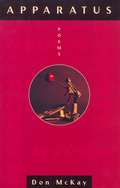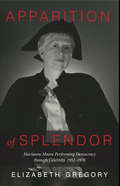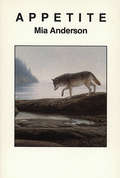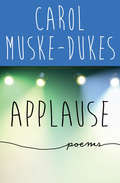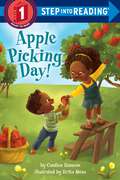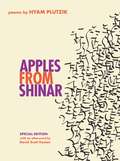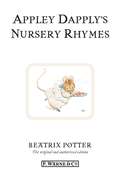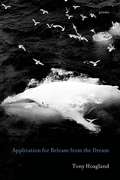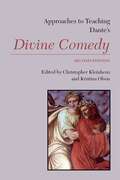- Table View
- List View
Antología personal
by Juan Manuel RocaUna completa antología temática con los mejores poemas de Juan Manuel Roca. El cuerpo, las ciudades, las estatuas, la nada, las parábolas, son algunos de los temas que han estado presentes en la obra de Roca y son los ejes bajo los que se agrupan sus mejores poemas en esta edición especial con la que Lumen celebra su poesía. Una selección que va desde 1973 hasta la actualidad y que incluye unos pocos poemas inéditos La crítica ha dicho… "La metáfora en Juan Manuel Roca es siempre reflexiva. Acompaña sin aliños, descalza, soslayando cualquier amago de patetismo. Acompaña y consuela".Héctor Rojas Herazo "Juan Manuel Roca es una de las piezas claves del aparato de la poesía latinoamericana de hoy. Oficiante de una misa para magos en la nao de los locos que se dirige hacia América". Juan Calzadilla "La poesía de Roca es una forma de dialogar desde las márgenes sobre lo impugnado y lo excluido: el transterrado, el vagabundo, el aguafiestas, el incierto". Jorge Boccanera "He aquí una explosión de Roca fosfórica". Luis Vidales "Roca advierte que las ruinas ya estaban presentes en la fundación misma de la ciudad, anticipando de este modo su desvanecimiento y su fracaso, pero también su trascendencia y su inmortalidad". Eduardo Chirinos "Roca nos hechiza y sumerge, sin transiciones, en el perímetro encantado de sus sueños. Nos pone a soñar por cuenta suya y, en tales ensoñaciones, César Vallejo puede invitarnos a una cena". Germán Espinosa
Antología poética
by Edna St. Vincent MillayPREMIO PULITZER Y MEDALLA ROBERT FROST «La mejor poeta desde Safo.»Poetry «Una atrevida visión de la experiencia femenina, con una gran carga sexual. [...] Su poesía brilla aún más cuando refleja las ansias de rebelión.»The Guardian Edna St. Vincent Millay es una de las escritoras norteamericanas más fascinantes y menos conocidas del siglo xx. Perteneciente a la generación de T. S. Eliot y Wallace Stevens, su militancia feminista y su radical independencia provocaron que su obra tardara en difundirse, a pesar de haber ganado el Premio Pulitzer por su «Balada de la hilandera del arpa», de contar con una personalidad arrolladora y de congregar a multitudes en sus lecturas y polémicas apariciones públicas, que hicieron de ella una precursora de una nueva forma de ser mujer. Nunca temió proclamar sus ideas políticas y proponer innovadoras vías de expresión de la experiencia femenina. Millay escribió libretos de ópera, teatro y prosa, pero destaca sobre todo por su poesía, extraordinariamente virtuosa -es autora, con Robert Frost, de algunos de los mejores sonetos del siglo xx en inglés-. Aunque vinculada con la vanguardia anglosajona, su voz única es capaz de cantar la belleza como una poeta emotiva y de componer a su vez poemas satíricos y provocadores. Lumen presenta la antología más completa en castellano de su obra poética, en una magnífica edición y traducción de Ana Mata Buil. La crítica ha dicho...«Preocupada simultáneamente por la indagación formal y por la instancia política de su escritura, Edna St. Vincent Millay ha quedado opacada a ojos de la historia por coetáneos masculinos como T.S. Eliot o Robert Frost, con los que trabajó cerca. Décadas más tarde, su voz rebota con fuerza en las paredes.»Zenda «La mejor poeta mujer desde Safo.»Harriet Monroe, Poetry «Una de las figuras más fascinantes de los felices años 20. [...] El amor y el dolor, la soledad y la muerte, la naturaleza y la imagen recurrente del mar son lugares habituales en su poética, en la que se rebeló contra las máscaras de la feminidad y que debió ser un clásico.»Vanessa Graell, El Mundo - La Esfera de Papel «Un talento literario incandescente. [...] Millay ofreció una atrevida visión de la experiencia femenina, con una gran carga sexual. [...] Su poesía brilla aún más cuando refleja las ansias de rebelión contra el espacio reservado a las voces de mujeres en la literatura y en la vida.»Amandas Ong, The Guardian «Una de las poetas más exitosas y respetadas de Estados Unidos. [...] Consiguió algunos de los mejores sonetos del siglo XX, al igual que Frost.»Poetry Foundation
Antología poética
by Miguel HernándezNueva antología de Miguel Hernández, uno de los grandes poetas españoles del siglo XX Introducción de Daniel Aguirre Oteiza Antología poética ofrece una cuidada selección de los poemas más famosos y recordados de Miguel Hernández, con muestras representativas de todos los poemarios que el escritor publicó en vida: Perito en lunas, Elrayo que no cesa, Imagen de tu huella, El silbo vulnerado, Viento del pueblo y El hombre acecha. No faltan, por otra parte, los poemas menos conocidos, las composiciones que solo vieron la luz en la colección póstuma Cancionero y romancero de ausencias o incluso un inédito. Como argumenta el catedrático de Harvard Daniel Aguirre Oteiza en su brillante introducción, el conjunto permite apreciar el valor histórico y memorístico que ha ido adquiriendo esta enorme poesía, al tiempo que nos invita a acercarnos a ella con una nueva mirada desde nuestra posición histórica siempre cambiante. Sobre el autor y su obra:«Miguel Hernández cantaba con su voz de bajo y su cantar era como si todos los árboles cantaran. Como si un solo árbol, el árbol de una España naciente y milenaria, empezara a cantar de nuevo sus canciones».Octavio Paz «Recordar a Miguel Hernández, que desapareció en la oscuridad, y recordarlo a plena luz, es un deber de España, un deber de amor. Pocos poetas tan generosos y luminosos como el muchachón de Orihuela cuya estatua se levantará algún día entre los azahares de su dormida tierra».Pablo Neruda «Uno de los más grandes poetas españoles del siglo XX: nos deslumbran la generosidad y la maestría miméticas; la fiesta de metáforas, ritmos y acentuaciones; la lujuria verbal y la cuantiosa cantidad de prestigiosas constelaciones de imágenes».Félix Grande, El País«El poeta necesario».Buero Vallejo «El poeta consumado de la luz, la oscuridad, el alma, el tiempo, la muerte».Willis Barnstone
Antología poética
by William Butler YeatsW.B. Yeats es, junto a Ezra Pound y T.S. Eliot, el gran renovador de la poesía europea del siglo XX. W.B. Yeats es, junto a Ezra Pound y T.S. Eliot, el gran renovador de la poesía europea del siglo XX. Nacido en Irlanda, su obra está transida de la mitología céltica, los ritmos del modernismo sajón y la fiebre de sus pasiones ocultistas y esotéricas. Lumen presenta aquí una rigurosa antología de toda su obra, seleccionada y prologada por el también irlandés y Premio Nobel de Literatura Seamus Heaney. La traducción corre a cargo de poeta Daniel Aguirre, quien ha llevado a cabo una impecable versión rimada, sin duda una de las aportaciones más brillantes que se han hecho a la traducción de poesía en nuestro país.
Antología poética: Selección y prólogo de Joan Manuel Serrat
by Mario BenedettiSERRAT LEE A BENEDETTI Una antología personal con motivo del centenario del autor uruguayo, el poeta contemporáneo en español más querido por varias generaciones de lectores. «Yo soy poeta / señores: / y usted debe saber que los poetas / vivimos a la vuelta de este mundo.» «No es fácil escoger lo más representativo entre la extensa obra de Benedetti, pero confío en que en esta antología estén representados todos los Benedettis que Mario cargaba en su mochila -el oficinista rutinario, el montevideano de clase media, el periodista comprometido, el viajero curioso, el militante de la patria doméstica, el exiliado y el desexiliado, y también el intelectual parcial, el luchador político y, por supuesto, el poeta minucioso y trabajador que nunca dejó de ser-, con la esperanza de que esta selección pueda resultarle tan útil al lector familiarizado con el mundo literario del poeta uruguayo como a aquel que llegue por primera vez a sus versos. Mario Benedetti ha sido uno de los escritores más fecundos y populares de América Latina. Un hombre de aspecto frágil y sencillo, de gesto y voz mesurada, que acercó a la gente su palabra despojada de solemnidad. Escribió, a contramano de las modas imperantes y de la crítica, historias que son las peripecias del hombre medio. Visitó todos los géneros literarios: la novela, el relato, el teatro, pero fue la poesía su género predilecto, el que marcó más intensamente su vocación y el más abundante y popular de toda su obra. Probablemente Benedetti sea el poeta más leído en nuestro idioma y, con toda seguridad, el más cantado.» Joan Manuel Serrat La crítica ha dicho:«Me apasiona su poesía y su actitud ante la vida. Ha legado a Latinoamérica los ideales de libertad, justicia y solidaridad. Benedetti no nos dejará nunca, siempre estarán sus poesías.»Joan Manuel Serrat «De su mundo literario nos quedan los bellos poemas y relatos que escribió, reivindicando con amor esas vidas incrustadas en la monotonía de la rutina, de heroísmo discreto, que van puntualmente a la oficina.»Mario Vargas Llosa «Él nos enseñó que la poesía no es inventarse un lenguaje raro al margen de la sociedad sino tratar de la manera más respetuosa posible el lenguaje de la tribu. La necesidad de una dimensión cívica y ética de las palabras me parece importante y ahí está la enseñanza de Mario Benedetti.»Luis García Montero «Hay que leer una y otra vez su obra. Es lo mejor que podemos hacer.»Ángeles González-Sinde «Esa combinación de tristeza e ironía, y de ingenuidad a veces rabiosa, que hay en sus versos, y en su vida, es la música que debe sonar de fondo.»Juan Cruz «Los versos de Benedetti saben a calle y a corazón partido y por eso muchos de ellos han sido cantados.»Joaquín Sabina «Un referente de la literatura contemporánea.»El País «Un poeta de referencia, [...] un maestro: alguien cercano cuya poesía lo es todavía más.»Elvira Sastre «Mi primer contacto con la poesía ha sido de la mano de Mario Benedetti. [...] Su influencia se puede ver en mi música y en mi forma de estar en el mundo.»Ismael Serrano «Una vez que entra, se queda para siempre.»Rozalén «Uno no es Mario Benedetti por casualidad: lo es por ser capaz de escribir poemas, relatos, en los que hay amor, compromiso, ideología, sensibilidad, [...] y hacer una épica de todo aquello que hacemos a diario.»Benjamín Prado «Me fascinó su sensibilidad y generosidad a la hora de escribir a pecho descubierto.»Vanesa Martín «Seguramente sea, junto con Neruda, el poeta más leído en español por muchas generaciones. La gente, a día de hoy, once años después de que nos dejara, sigue compartiendo sus poemas, que son diáfanos, sin barreras arquitectónicas, ma
Ants on the Melon: A Collection of Poems
by Virginia Hamilton Adair" Virginia Adair speaks directly and unaffectedly, in an accent stripped of mannerism and allusion. Ants on the Melon exhibits enough formal variety, freshness, and intelligence to confirm, at one stroke, that Ms. Adair is a poet of accomplishment and originality. " --Brad Leithauser, The New York Times Book Review " Extraordinarily moving. Her voice is clear, assured, varied, and utterly her own. " --A. Alvarez, The New York Review of Books " The rhyme is ingenious, the humor saucy and unsparing, and the author clearly takes a delight in perversity, in an inversion of the expected. " --Alice Quinn, The New Yorker " How bright and unmuddled and unaffected and unswerving these poems are. There's such aplomb, no faking, such a true hard edge. They never miss. " --Alice Munro " Adair writes with a thinking heart's and a feeling mind's unusual clarity. Here is a sensual, wise, precise, amazing voice. " --Sharon Olds Virginia Hamilton Adair is America's most widely read and respected serious poet. Ants on the Melon has already become a landmark in the nation's literary history, and the advent of this paperback edition guarantees that her great gifts will be recognized and appreciated by an even larger audience.
Antífona
by Andrés MonteroPoesía mística con Rock 'n' Roll. Antífona es un poema místico sobre Dios encarnado en el ser humano de Jesús de Nazaret para convertirse en el Cristo del tiempo y de más allá del tiempo. Las estrofas son tan irregulares como la existencia, tan abstractas como el misterio, casi siempre tan ásperas como el desencuentro. La fraseología de los versos intenta simular la sensación de estar caminando por el pedregal del desierto, de climatología extrema, prometiendo la belleza desnuda a quien no busque refugio en las convenciones. Existencialmente, Antífona es una población de poemas que no terminan de encajar entre sí del todo, como países con fronteras sísmicas; un territorio lírico donde cohabitan Jesús, María, la Magdalena y el resto de apóstoles, con Juan el Bautista; todos en medio de un mundo salpicado muy a menudo por la fragilidad inherente a los seres perdidos, iluminado en ocasiones por la grandeza que sutilmente enraíza en lo pequeño, e imperecederamente abierto a la esperanza de redención.
Anvil, Clock and Last
by Paulette RoeskeLike the seismic shifts and explosions that reveal hidden features of the earth, Paulette Roeske's poems record upheavals and jolts of self-knowledge in the seeming-solid world where we hammer out our lives. The labor of poetic creation cracks open the self: "How could I have guessed the geode's / rare concentrics, its brilliant sharp-toothed crystals / ... It was hope that returned me to the hammer / to lay open the bright interiors / I could have overlooked". Readers will find that hope rewarded as the poet wields the tools of time and legacy -- anvil, clock, and last -- to craft meticulous verses yielding glittering insight. The clock is omnipresent in this collection, signaling the exquisite tension between the desire to erase the past and the urge to devour all experience. A father's legacy to a daughter is inescapable: "He's left his mark on everything / time filtered through his hands. He's left / it all to me". But Roeske's rare intensity and depth of thought produce poems of mortality and loss balanced by the unexpected appearance of love. After guiding us through the hard forging of a self, the poet places us on the "platform, springboard, raft, or tippy boat", urging us to see love, like all life's experiences, as "a place to fling yourself into", eyes open, fingers crossed.
Anybody: Poems
by Ari Banias"Ari Banias is one of the best living poets, and this book in your hands is our proof. Anybody is the courage of a poet who trusts the strength of poetry to make room in our world for everybody." --CAConrad In Anybody, Ari Banias takes up questions of recognition and belonging: how boundaries are drawn and managed, the ways he and she, us and them, here and elsewhere are kept separate, and at what cost identities and selves are forged. Moving through iconic and imagined landscapes, Anybody confronts the strangeness of being alive and of being a restlessly gendered, queer, emotive body. Wherever the poet turns--the cruising spaces of Fire Island, a city lake, a Greek island, a bodega-turned-coffee-shop--he finds the charge of boundedness and signification, the implications of what it means to be a this instead of a that. Witty, tender, and original, these poems pierce the constructs that define our lives.
Anyone
by Nate KlugMilton’s God Where I-95 meets The Pike, a ponderous thunderhead flowered-- stewed a minute, then flipped like a flash card, tattered edges crinkling in, linings so dark with excessive bright that, standing, waiting, at the overpass edge, the onlooker couldn’t decide until the end, or even then, what was revealed and what had been hidden. Using a variety of forms and achieving a range of musical effects, Nate Klug’s Anyone traces the unraveling of astonishment upon small scenes--natural and domestic, political and religious--across America’s East and Midwest. The book’s title foregrounds the anonymity it seeks through several means: first, through close observation (a concrete saw, a goshawk, a bicyclist); and, second, via translation (satires from Horace and Catullus, and excerpts from Virgil’s Aeneid). Uniquely among contemporary poetry volumes, Anyone demonstrates fluency in the paradoxes of a religious existence: "To stand sometime / outside my faith . . . or keep waiting / to be claimed in it. ” Engaged with theology and the classics but never abstruse, all the while the poems remain grounded in the phenomenal, physical world of "what it is to feel: / moods, half moods, / swarming, then darting loose. ”
Aphrodite's Daughters: Three Modernist Poets of the Harlem Renaissance
by Maureen HoneyThe Harlem Renaissance was a watershed moment for racial uplift, poetic innovation, sexual liberation, and female empowerment. Aphrodite's Daughters introduces us to three amazing women who were at the forefront of all these developments, poetic iconoclasts who pioneered new and candidly erotic forms of female self-expression. Maureen Honey paints a vivid portrait of three African American women--Angelina Weld Grimké, Gwendolyn B. Bennett, and Mae V. Cowdery--who came from very different backgrounds but converged in late 1920s Harlem to leave a major mark on the literary landscape. She examines the varied ways these poets articulated female sexual desire, ranging from Grimké's invocation of a Sapphic goddess figure to Cowdery's frank depiction of bisexual erotics to Bennett's risky exploration of the borders between sexual pleasure and pain. Yet Honey also considers how they were united in their commitment to the female body as a primary source of meaning, strength, and transcendence. The product of extensive archival research, Aphrodite's Daughters draws from Grimké, Bennett, and Cowdery's published and unpublished poetry, along with rare periodicals and biographical materials, to immerse us in the lives of these remarkable women and the world in which they lived. It thus not only shows us how their artistic contributions and cultural interventions were vital to their own era, but also demonstrates how the poetic heart of their work keeps on beating.
Apocalipse 23
by Michele Fabbri"Apocalipse 23" já ganhou incontáveis prêmios literários e foi bem recebido pelos críticos. Tornou-se um livro cult através do BookCrossing, pois tem sido o primeiro livro no ranking dos "most traveled" e ainda é o primeiro livro em italiano nessa classificação.
Apocalipsis 23
by Michele Fabbri"Apocalipsis 23" ha obtenido numerosos premios literarios y ha sido acogido con favor de la crítica. Se ha vuelto libro de culto gracias al bookcrossing, pues ha estado durante largo tiempo como el primer libro en la clasificación de los "most traveled" y aún es el primer libro italiano en ese puesto.
Apocalypse 23
by Michele Fabbri"Apocalypse 23" has won numerous literary awards and has been welcomed by critics. It has became a cult book thanks to bookcrossing as has long been the first book in the ranking of "most traveled" and still is the first Italian book in standings.
Apocalypse 23
by Michele FabbriUne compilation de poésie obscure et inquiétante: qui habet aurem audiat...
Apostle of Desire
by Bruce WeiglTwo-time Pulitzer Prize finalist and one of America’s most revered military veteran writers —Bruce Weigl brings readers face-to-face with our country’s legacy of violence, the suffering of combat PTSD, and what it means to be truly haunted.Taking its cue from James Wright’s goal to write “the poetry of a grown man,” the poems in Apostle of Desire juxtapose the peace and comfort offered by the natural world with the bruising intensity of manmade violence. These sudden tonal shifts express a vulnerability and extremity of feeling that strips audiences’ own emotions bare, leading readers to question their roles as bystanders and consumers of violent media.In sharing his intertwining feelings of love and shame for both country and self, Weigl places readers into the role of the watcher and opens a window into the traumas of the Vietnam War and life’s daily battles with PTSD. The honesty of Weigl’s poetry exposes the ghosts of pain while still witnessing the glories of love, nature, and his ongoing experiences with the rich daily life of contemporary Vietnam.Readers will face the solitude of regret and the hopeful pursuit of redemption—remembering the past and looking toward the future.
Apparatus
by Don Mckay“There’s a place / between desire and memory, some back porch / we can neither wish for nor recall,” writes Don McKay inApparatus. The poems in this collection home in on that place – those keenly desired places – where language will not reach. Apparatusis Don McKay’s first collection of new poems since his 1991 award-winningNight Field. It is a passionate engagement with nature and a powerful critique of human assaults on wilderness which, for McKay, is more than unsubdued nature; it is whatever eludes the mind’s categories – the insoluble secret of life itself. To read McKay’s poems is to be in touch with the significant concerns of our time and all time. McKay is a poet of unmatched linguistic playfulness, with virtuoso flexibility of voice and an ability to shape-shift through forms, tones, and styles.
Apparition of Splendor: Marianne Moore Performing Democracy through Celebrity, 1952–1970
by Elizabeth GregoryWhile the later work of the great Modernist poet Marianne Moore was hugely popular during her final two decades, since her death critics have condemned it as trivial. This book challenges that assessment: with fresh readings of many of the late poems and of the iconic, cross-dressing public persona Moore developed to deliver them, Apparition of Splendor demonstrates that Moore used her late-life celebrity to activate egalitarian principles that had long animated her poetry, in daring and innovative ways. Dressed as George Washington in cape and tricorn and writing about accessible topics, she reached a wide cross-section of Americans, engaging them in consideration of what democracy means in their daily lives, around issues of gender, sexuality, racial integration, class, age, immigration, and species-ism. Her work resonates with that of her younger contemporaries, including poets like John Ashbery, Frank O’Hara, and Elizabeth Bishop, and artists like Andy Warhol, Yoko Ono, and Ray Johnson. Published by the University of Delaware Press. Distributed worldwide by Rutgers University Press.
Appetite
by Mia AndersonVerve, energy, wit, piquance and pure linguistic excitement: Mia Anderson's poetry is a whole cookbook of poetic experiences. Anderson is always ready to take big risks, and her work shows her love of life in its manyness and accident, as well as a delight in the intricate prism of language. Appetite includes the long poem sequence "The Saugeen Sonata" which won The Malahat Review's Long Poem Prize in 1988.
Applause: Poems
by Carol Muske-DukesNational Book Award finalist Carol Muske-Dukes explores joy, dread, and the solitary communion of applauseApplause provides twenty vivid and evocative poems by Carol Muske-Dukes. In &“Dream,&” she seeks the past in reverie, along with bicoastal riffs on New York City and Los Angeles. &“The Eulogy&” paints the scene of a funeral in sunny California where a young man who has died of AIDS is laid to rest. In the title poem, a twelve-part journey through the ritual of applause, Muske-Dukes examines the power of a gesture—clapping—to transform oneself from individual to communal. &“What a strange phenomenon,&” she says, &“to be single and plural at once, to feel joy and dread simultaneously, to wish to acknowledge publicly one&’s anonymity.&”
Apple Picking Day! (Step into Reading)
by Candice RansomWho doesn&’t love to go apple picking at the first sign of fall? A sister and brother celebrate autumn with a trip to a local apple orchard in this simple, rhyming Step 1 early reader. The kids bound with glee through the rows of trees, and race against other children to pick the most and the best apples. The story of their day is bright, fun, and full of light action. It&’s told in easy-to-follow rhyme, ensuring a successful reading experience. Step 1 Readers feature big type and easy words. Rhymes and rhythmic text paired with picture clues help children decode the story. These books are for children who know the alphabet and are eager to begin reading.
Apples from Shinar (Wesleyan Poetry Series)
by David Scott Kastan Hyam PlutzikApples from Shinar was Hyam Plutzik's second complete collection. Originally published in 1959 as a part of Wesleyan University Press's newly minted poetry series, the collection includes "The Shepherd"--a section of the book-length poem "Horatio," which earned Plutzik a finalist position for the Pulitzer Prize. "The love and the words and the simplicity," that mark Plutzik's poetry, writes Philip Booth, "are all here [in Apples from Shinar], and the poems come peacefully, and wonderfully, alive." With a previously unpublished foreword by Hyam Plutzik and a new afterword by David Scott Kastan, this edition marks the centenary of Plutzik's birth and will introduce a new generation of readers to the work of one of the best mid-century American poets.
Appley Dapply's Nursery Rhymes (Beatrix Potter Originals)
by Beatrix PotterThis original, authorised version has been lovingly recreated electronically for the first time, with reproductions of Potter's unmistakeable artwork optimised for use on colour devices such as the iPad. Beatrix Potter gathered material for a book of rhymes over many years. In 1917, when her publisher was in financial difficulties and needed her help, she suggested that Appley Dapply's Nursery Rhymes could be brought out quickly, using her existing collection of rhymes and drawings. The fact that the illustrations were painted at different times explains why the style occasionally varies.Appley Dapply's Nursery Rhymes is number 22 in Beatrix Potter's series of 23 little books, the titles of which are as follows:1 The Tale of Peter Rabbit2 The Tale of Squirrel Nutkin3 The Tailor of Gloucester4 The Tale of Benjamin Bunny5 The Tale of Two Bad Mice6 The Tale of Mrs. Tiggy-Winkle7 The Tale of Mr. Jeremy Fisher8 The Tale of Tom Kitten9 The Tale of Jemima Puddle-Duck10 The Tale of the Flopsy Bunnies11 The Tale of Mrs. Tittlemouse12 The Tale of Timmy Tiptoes13 The Tale of Johnny Town-Mouse 14 The Tale of Mr. Tod15 The Tale of Pigling Bland16 The Tale of Samuel Whiskers17 The Tale of The Pie and the Patty-Pan18 The Tale of Ginger and Pickles19 The Tale of Little Pig Robinson20 The Story of a Fierce Bad Rabbit21 The Story of Miss Moppet22 Appley Dapply's Nursery Rhymes23 Cecily Parsley's Nursery Rhymes
Application for Release from the Dream: Poems
by Tony HoaglandThe eagerly awaited, brilliant, and engaging new poems by Tony Hoagland, author of What Narcissism Means to Me The parade for the slain police officergoes past the bakeryand the smell of fresh breadmakes the mourners salivate against their will.—from "Note to Reality"Are we corrupt or innocent, fragmented or whole? Are responsibility and freedom irreconcilable? Do we value memory or succumb to our forgetfulness? Application for Release from the Dream, Tony Hoagland's fifth collection of poems, pursues these questions with the hobnailed abandon of one who needs to know how a citizen of twenty-first-century America can stay human. With whiplash nerve and tender curiosity, Hoagland both surveys the damage and finds the wonder that makes living worthwhile. Mirthful, fearless, and precise, these poems are full of judgment and mercy.
Approaches to Teaching Dante's Divine Comedy (Approaches to Teaching World Literature #163)
by Christopher Kleinhenz and Kristina OlsonDante's Divine Comedy can compel and shock readers: it combines intense emotion and psychological insight with medieval theology and philosophy. This volume will help instructors lead their students through the many dimensions--historical, literary, religious, and ethical--that make the work so rewarding and enduringly relevant yet so difficult.Part 1, "Materials," gives instructors an overview of the important scholarship on the Divine Comedy. The essays of part 2, "Approaches," describe ways to teach the work in the light of its contemporary culture and ours. Various teaching situations (a first-year seminar, a creative writing class, high school, a prison) are considered, and the many available translations are discussed.
